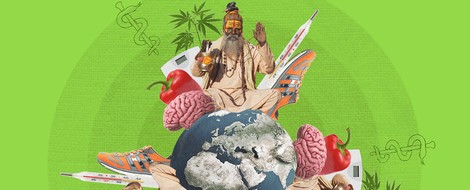Your podcast discovery platform
Curious minds select the most fascinating podcasts from around the world. Discover hand-piqd audio recommendations on your favorite topics.

piqer for: Global finds Health and Sanity Doing Good
Bangalore-based Rashmi Vasudeva's journalism has appeared in many Indian and international publications over the past decade. A features writer with over nine years of experience heading a health and fitness supplement in a mainstream Indian newspaper, her niche areas include health, wellness, fitness, food, nutrition and Indian classical Arts.
Her articles have appeared in various publications including Mint-Wall Street Journal, The Hindu, Deccan Herald (mainstream South Indian newspaper), Smart Life (Health magazine from the Malayala Manorama Group of publications), YourStory (India's media technology platform for entrepreneurs), Avantika (a noir arts and theatre magazine), ZDF (a German public broadcasting company) and others.
In 2006, she was awarded the British Print-Chevening scholarship to pursue a short-term course in new-age journalism at the University of Westminster, U.K. With a double Masters in Globalisation and Media Studies from Aarhus Universitet (Denmark), University of Amsterdam and Swansea University in Wales, U.K., she has also dabbled in academics, travel writing and socio-cultural studies. Mother to a frisky toddler, she hums 'wheels on the bus' while working and keeps a beady eye on the aforementioned toddler's antics.
Your Grandchildren Are What You Eat (And Perhaps What You Feel)
You are what you eat. My grandmother kept dinning this adage into my head. This article is all about how it should actually read 'your grandchildren are what you eat'.
Nutritionists have long been investigating the complex relationship between genes and diet. For instance, a woman's diet in her childhood has been discovered to have more impact on her baby's birth weight than what she eats while she is pregnant.
Epigenetics, the study of how biology and environment affects our genes, is becoming all significant. Understanding the effects of nutrition on what scientists call ‘gene expression’ has become critical in preventing and treating diseases such as cancer, Alzheimer’s, obesity and diabetes.
Furthermore, epigenetics is not restricted to treatment of diseases. An example quoted in the article is telling. Research published in Nature Genetics and Biological Psychiatry in 2016 and 2017 have separately confirmed connections between the diet of pregnant mice and particular diseases in their offspring. One study was of genetically identical mice that produced obese offspring with impaired glucose intolerance while the other explored the link between infection in pregnant mice and neurodevelopmental disorders in its babies.
But finding these links is not easy. The article (despite the overt declaration by Scientific American that it is sponsored by Nestlé) assumes significance precisely because of this opacity. In real life (as opposed to lab studies), gene expression in humans is affected not just by diet and nutrition but also exercise, environment and even moods. This ‘sheer complexity of the epigenome’ makes discerning patterns and identifying signals tricky. The possibility of even stress and emotional traumas being transmitted to future generations is immense as discovered in genes of the children of Holocaust survivors that show increased risk of stress disorders. Which is why it is heartening to see more and more scientists trying to solve this puzzle.
Stay up to date – with a newsletter from your channel on Health and Sanity.
